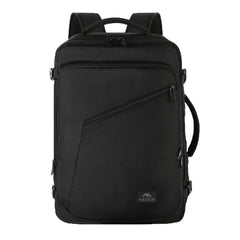Outdoor hiking with best laptop backpack for travel is a favorite of many people who love to travel. Hiking is an exercise that focuses on aerobic metabolism, has a long duration, and consumes a lot of energy. Especially in spring, the climate is relatively dry and the temperature difference between day and night is relatively large. Therefore, when doing trekking exercises, pay more attention to the nutritional status of the body and carry out reasonable nutrient supplements.

Replenishing water is important
When hiking outdoors, the human body will sweat a lot. Due to the dry climate in autumn and strong sunlight on the mountains, people will always feel thirsty. At this time, replenishing water is particularly important. When the human body is thirsty and lack of water, it will cause a decline in exercise capacity, and replenishing water can restore the exercise capacity of hikers. During exercise, the body temperature is constantly rising. Active hydration can help the body cool down, maintain the stability of the internal environment and promote the excretion of metabolic waste from the body.
To supply enough heat
Since trekking is a relatively large exercise for digesting energy, energy supply is very important. Hiking enthusiasts should prepare a certain amount of food in their carry on backpacks according to the length of the route. Food should include the three major functional substances of carbohydrate, protein, and fat, and try to maintain a balanced nutrition.
Carbohydrates generally choose foods such as bread and cakes. High-fat nuts and chocolate have high energy and small size, which is a good functional food for long-term aerobic exercise such as mountaineering. Protein is recommended to choose luncheon meat, canned fish, ham sausage, fish sauce, soy products and other foods with higher protein content.
When hiking, a large amount of electrolytes and water-soluble vitamins are also excreted with sweat. Therefore, when replenishing water, you must choose a sports drink containing electrolytes and vitamins to supplement it instead of just supplementing mineral water.

Replenish minerals in time
As the human body sweats, a large amount of minerals such as sodium and potassium are lost in the body. In addition to supplementing part of it with sports drinks, it can also be supplemented with food or seasonings (soups and other appropriate amounts) to maintain the body's exercise capacity and prevent premature fatigue.
Multivitamin supplementation is necessary
Since long-distance walking is an activity that consumes more oxygen, a large amount of oxygen free radicals will be produced in the body. Therefore, in addition to supplementing the consumption and loss of vitamin C and B vitamins, it is also necessary to supplement some antioxidant vitamins, such as vitamin E, lycopene, etc., to improve the body's immunity. This can prevent weakened immunity and easy illness after strenuous exercise.
It is best not to drink coke for before and after half an hour exercise
For many people, after outdoor sports, a bottle of ice-cola will feel "very refreshing", but refreshing does not mean healthy. In the eyes of sports nutrition experts, coke is a drink you cannot choose after exercise, because it will make you "acidosis" probably.
Matein hot topic backpacks recommendation



